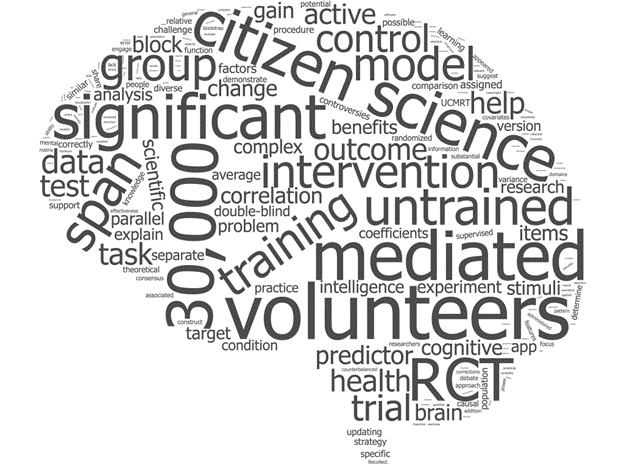Please help us recruit 30,000 adults for a UC Citizen Science project on cognitive training

Wordcloud derived from the two papers referenced in this blog (by Susanne Jaeggi & Aaron Seitz)
How can we cut through the controversies around brain training and unlock the exciting potential as suggested by the numerous published studies showing examples of cognitive training benefits?
Our approach is to use larger, more representative datasets to uncover the most relevant ingredients that may work across different intervention types, illustrating how their impact may vary across the diverse range of individuals participating in such large trials.
While most studies focus on the average participant, our latest paper provides an important example of how, even within a single study, the outcomes can differ widely across participants.
We found that in order for participants to show broad benefits as a result of cognitive training (i.e., far transfer), they first need to improve within the trained domain (i.e., show near transfer). While this may seem to be a common sense observation, it is a critical step in clarifying that while not everyone seems to be able to improve on the training task, there are methods to account for this variance while still recognizing the training benefits experienced by other participants in the same study. As such we note that our emerging field is only beginning to understand the factors that mediate the potential benefits, and the barriers preventing them.
That’s where Citizen Science comes in:
In our ongoing large-scale study we aim to recruit 30,000 adults who are motivated and willing to help us better understand the factors that underlie learning outcomes using a variety of training paradigms and outcome measures. Our endeavor will ultimately contribute to the personalization of cognitive training so that, hopefully, anyone who would like to improve their cognitive functioning will be able to choose the approach that may fit them best.
To accomplish this, we need your help.
We have opportunities for everyone and also, specifically, for research partners:
If you are interested in trying out working memory training for yourself, volunteers are encouraged to sign-up at our web-portal HERE, where you can also learn more about the ongoing project.
For scientists interested in collaborating and helping carry out this momentous research project, we invite you to join our new Cognitive Health Initiative Research Partnership. Through this new partnership model we can provide resources that can support faculty, practitioners, students, and other scientists to advance the research agenda, contribute novel research questions, and be supported in advancing them. If interested, please contact us HERE.
To Learn More:
- Large UC study to investigate when and how brain training transfers (or does not) to broader cognitive and health benefits
- Solving the Brain Fitness Puzzle Is the Key to Self-Empowered Aging
- Can brain training work? Yes, if it meets these 5 conditions
- What are cognitive abilities and how to boost them?


